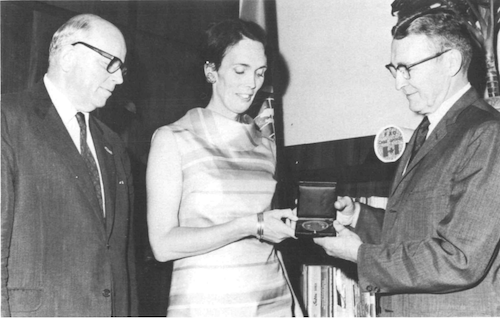Erna Bennett was unique. Well, not quite. There have been other Erna Bennetts, one of whom died almost exactly a year ago. Although I never met “our” Erna Bennett, I like to think that she would actually be tickled to have been confused with Erna Bennett of Richmond, VA in the United States. I say this because Erna seems to have taken some trouble not to be easily found, and a decoy would have been an appropriate ploy.
In the wake of her death last week, different people have drawn attention to her importance to the field of agricultural biodiversity and to the dearth of good biographical material. Although we were early pioneers in recent years, with the briefest possible post the day after her 83rd birthday, the hunt was taken up by our friend and colleague Danny Hunter, who also broke the news of her passing, at least to us.
Danny’s previous forays, like ours, drew forth some comments from people who had known Erna professionally and privately. Reading some of them, one longs to know more, and yet it would be sad also to think that only with her death will these things become known.
Hunting for more about Erna the person, I found a piece that The Ecologist magazine reprinted in 2010, 40 years after it first appeared. (Danny had found it first.) Two things are absolutely remarkable about this. First, it was reprinted from the FAO’s old journal CERES, which seems to have no recollection of it, and that alone encourages me to make it more widely available. Secondly, the arguments, not only from Erna but also from Otto Frankel and Jack Harlan Jr (and WK Agble), remain absolutely current. Apart from a slight quirkiness of language, you could read their answers to a modern audience and have them nodding sagely along. And you would be able to add a few more examples.
Bits of biography do exist, with tantalising hints that she may have been a pilot delivering planes in World War II, among other things. There is, however, so much more one could say, not least about the politics within FAO, and I hope that in time Danny is going to say it.
I haven’t been able to find either the Canadian film Fragile Harvest or the Youtube videos that people have mentioned, although I am sure I remember seeing some of that footage. If the material exists still, it should end up in Web of Stories, that’s for sure. Anyone know where those recordings might be?
Gregg Borschmann interviewed Erna on 21 November 1994 for an oral history project focusing on environmental awareness in Australia. The recordings and a corrected typescript of 89 pages are available from the National Library of Australia. While in Australia, Erna seems also to have been active in the Socialist Party of Australia, reporting on a meeting of the Central Committee (of which she was a member) that took place a month before the oral history interview. She wrote for organs of the Communist Party of Australia and served on the Editorial Board of the Australian Marxist Review. I wonder what she thought of Stalin’s persecution of the “bourgeois” science of genetics, and especially of the fate of NI Vavilov?
For her 83rd birthday, MS Swaminathan, another early pioneer of agrobiodiversity conservation, wrote:
Erna’s untiring efforts helped to create global awareness of the need for accelerated efforts in the area of genetic resources conservation and sustainable use. Her life and work will always remain a source of inspiration and guidance to all young scholars who wish to save plants for saving lives and livelihoods.
But Erna was having nothing of it:
I did what I had to do because I believed in it, just as you too believe in what you are doing. Your own work is as important as anything I have done, and students and workers trained and inspired by you are the army of the future, who will have to face battles even more difficult than those we faced in the past. I hope you agree, so let’s quietly drop ideas of pouring praise in my direction. The future will need not only the inspiration of past battles but also the toil and sweat of future struggles, greater — from the way things now seem to be developing — than any of our generation ever faced.
